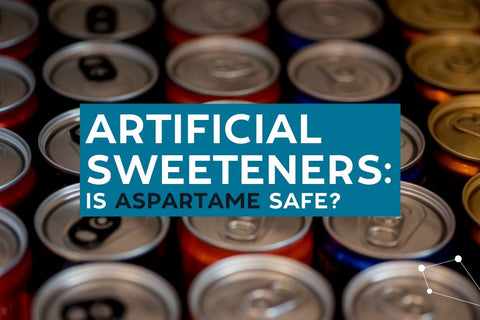Aspartame is a synthetic sweetener frequently used as a sugar replacement in more than 6000 foods and beverages. In recent years a great deal of controversy has arisen regarding the safety of aspartame which has led to many people developing a bad taste for the sweetener (pun intended). We review the evidence on aspartame to give you an informed perspective.
Aspartame was first discovered accidentally in 1969 and became popular as a calorie-free alternative that is 200 to 300 times sweeter than sugar. After ingestion, aspartame forms three metabolites - phenylalanine, aspartic acid, and methanol which are naturally found in foods such as bananas and milk. Milk for example contains 13 times more aspartic acid and 6 times more phenylalanine than the same volume of an aspartame-sweetened beverage. The difference between consuming these metabolites derived from aspartame as opposed to those naturally found in food is that the aspartame-derived metabolites are released rapidly into the blood stream in higher concentrations, owing to the fact that they are not bound to proteins (as is the case when they are naturally derived from foods).
The Acceptable Daily Intake (ADI) is set at 40mg per kilogram in many countries. An average 70kg person would have to consume around 15 cans of sweetened soft drink to exceed the ADI, which is around 100 times less than the amount considered to have potential to cause human health concerns. So what is all the fuss about when it comes to concerns about aspartame and human health?
The majority of concerns regarding potential adverse health effects caused by aspartame are derived from extrapolation of findings in animal studies to human populations. Animals have been found to respond to aspartame and its metabolites more rapidly than humans. Nevertheless, dosages of aspartame roughly equivalent to the ADI (40mg/kg) administered to animals (primarily mice and rats) has been found to cause increased oxidative stress and inflammation, as well as changes in emotion, anxiety, memory and cognition, and altered immune function. A few studies have also linked doses of aspartame in rats to increased incidence of cancer. However, there is no evidence that these same adverse effects occur in humans at the recommended dose limit.
To date, the safety of aspartame has been closely examined by the health authorities such as the World Health Organisation, the US Food and Drug Administration, and Food Standards Australia New Zealand (FSANZ), all of which have agreed that evidence supports the safety of aspartame to be used as a sweetener at the current ADI. In fact, aspartame is even considered a healthier alternative to sugar for certain population groups such as diabetics.
However, a review article published in 2017 suggests that despite the inherent uncertainty in extrapolating results from lab-based and animal studies to human populations, the bulk of the evidence to date points to the potential for aspartame to disrupt the oxidant/antioxidant balance, even at 'safe dosages', thereby inducing oxidative stress and chronic inflammation that could lead to adverse effects in humans.
The Bottom Line
The bottom line is that despite the lack of evidence confirming adverse effects in humans, lab-based and animal studies by and large point to pro-inflammatory effects of aspartame with the potential to lead to adverse health outcomes, which is yet to be refuted or confirmed in humans. If you are concerned about aspartame, it's best to avoid sweetened beverages altogether, whether or not they contain sugar or aspartame and stick to natural products and plain old water.
Source:
1. Choudhary A, Pretorius E. Revisiting the safety of aspartame. Nutrition Reviews [Internet]. 2017;75(9):718-730. Available from: https://academic.oup.com/nutritionreviews/article/
2. Aspartame [Internet]. Foodstandards.gov.au. 2021 [cited 19 May 2021]. Available from: https://www.foodstandards.gov.au/
3. Artificial sweeteners vs sugar (stevia, aspartame & more) | CHOICE [Internet]. CHOICE. 2021 [cited 19 May 2021]. Available from: https://www.choice.com.au/food-and-drink/nutrition/sugar/articles/sweeteners



